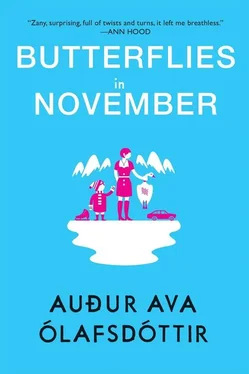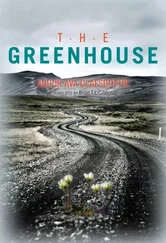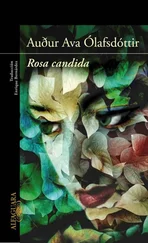“You’re incredibly unlucky,” the doctor tells me, “it’s almost incomprehensible. You seem to have jumped to the side and somehow managed to do the impossible, to bang your hand against the edge of the Guðfinna Kristjánsdóttir capelin ship.”
He looks like a doctor out of a novel, a handsome man who inspires confidence. He has small hands, though, hands are rarely mentioned in books that feature doctors.
“We’ve gone over all the security measures and couldn’t find any faults there. Eleven people jumped off ahead of you, no side winds or anything like that, you don’t have any suicidal tendencies, do you? Luckily, it was the contraction of the elastic that saved you and made you bounce back up when you landed; the radius of your right wrist is broken, you got off quite lightly, all things considered.”
Then I suddenly remember:
“Where’s the boy?”
“Your son’s in the other room. He’s doing a jigsaw.”
They usher him into the room of the health centre and position him at the end of the bed, from where he looks at me with anxious eyes.
How irresponsible of me, my son was on the point of becoming an orphan.
Once we’ve embraced each other as much as circumstances will allow, the boy opens his mouth to the doctor and points at a tooth. It’s loose.
“He’s a bit young to be losing a tooth,” says the doctor, “but it does happen.” The boy closes his mouth. Then the doctor turns back to me.
“How are you feeling?”
“Fine.”
“Don’t you remember me?”
That’s what they all say, it’s hardly very original. This is the third time in about as many days that I’m being asked this unfathomable question.
“No, should I?”
“We were at secondary school together and left at the same time. I often looked at you, without ever hitting on you. You were a bit too boyish-looking for my taste — but I remember your special linguistic talents and how you spoke all these exotic languages, even ones that weren’t being taught at the school.”
I remember him now. He immediately had a girlfriend. They sat in the corner and held hands, in a world of their own, and didn’t show up at parties. They’re still together, in fact, because she now appears from behind him to wrap a blood pressure cuff around my arm. He does the introductions for both of them:
“Don’t you remember Gugga? She went on to do nursing.” She greets me with professional detachment, without being distracted from her task.
A woman enters and places a tray of food in front of me on the bed. She offers Tumi some too, but he shakes his head. I’m not hungry, but am used to doing what I’m told. I manage to eat almost half of the sausage and a bit of the white sauce with my good hand before I throw up.
It is then that I get a shot of pain through the left side of my chest: my heart skips a beat and I feel as if it had just been clutched by a hand. For a moment it stops to beat, while it waits to see if the hand will squeeze it. I’m finding it difficult to breathe.
I tell them my heart hurts.
“You need to work out what you want. It was a warning. Why did you jump?”
“What do you mean?”
“That horse meat sausage was a test of your free will,” my doctor says, looking at his nurse. I sense they belong to the same world, that there’s a strong personal bond between them.
“Wasn’t that veal meat sausage?”
“No, horse meat, but it all comes down to the same thing, it obviously didn’t agree with you.” Once more the doctor and nurse exchange meaningful glances.
“Isn’t this just what all the patients get?”
“What do you enjoy doing?”
He talks to me as if I were a four-year-old, without taking his eyes off his wife. I answer like a fully grown woman:
“I enjoy being with my son and jogging,” I say, looking at my fingers protruding from the virgin-white plaster. “And I also like to go skating,” I add. I don’t feel it is appropriate to add anything else.
“That’ll be good for you when the weather picks up,” he says.
When we step out of the health centre, I see that my sign language teacher is waiting for us in his heated car.
He feels awful about having encouraged me to jump and looks seriously worried.
“I didn’t expect you to do it. I didn’t mean those words I said, it was just bullshit, I didn’t realize you were so docile.”
He has to go to Reykjavík for the weekend to see his kids and wants us to stay in his place while he’s away, so that I can recover. He is afraid it will be cold and damp up there in the chalet. I’m still in too much of a daze to be able to formulate any objections. Otherwise I could have said something like:
“Thanks for the thought, but I already have plans and I’m fine.”
“The fridge is full of food, for a change, I did some shopping. I’ll leave the dog behind, all you have to do is feed her and let her run in the garden. Don’t worry,” he adds with a smile, “the puppies aren’t due for another two weeks and I’ll be back on Sunday evening. She’s feeling a bit delicate too, so you’ll be good company for each other.”
“Thank you.”
“The kitten is no problem either, not for the dog at least.”
That is how we move down from the ravine to the shore, the boy, the kitten and I.
As he’s leaving, he pats the dog from top to bottom; he’s good to her. Next he pats the boy and then finally strokes me, adjusting my sling.
When you live in the home of an absent person, sleep in his bed, eat off his plates, skim through some of his books, occasionally opening one to read a small extract, you slowly develop an odd kind of understanding of him that isn’t far from affection. Or wonderment at what kind of man could be behind these books about saints and Japanese bonsai gardens?
His shirts hang in a doorless wardrobe with even gaps between them, most of them white, except for one that looks particularly gaudy. He doesn’t seem to own any ties. The fridge is crammed with food. He’s even bought cans of food for the cat. Without trying to actually work out the owner’s culinary tastes, I can’t help noticing that there are four types of olive oil in the house, and an equal number of bottles of vinegar.
“I roasted some lamb for you in the oven,” he said as he was leaving, “I hope that’s OK. You just have to heat it up, you can handle that, it was especially conceived for a one-handed person and slowly roasted for four hours — you could almost eat it with a spoon.”
The post-divorce bed linens of men are always new. Very few men take bed linens with them when they split up. They generally buy a set of two in the first round, and then another two a few weeks later, all the same type, rarely white, normally stripy blue, like the ones we’re lying in. The plates and cups also match and are still unchipped; the whole lot has been bought in a single trip, a complete set without the interference of any woman.
The dog seems to be tolerating the kitten quite well and treats him gently, almost with a touch of motherly care. Then she keels over to one side, spreading out her tummy and teats. The kitten vanishes under the sofa. The dog doesn’t want to eat, doesn’t want to drink and doesn’t want to play. The boy lies down beside her, patting her, and pulls a quilt over her. But she doesn’t want to be patted either and staggers about on four legs, moping aimlessly around the house for a good while, investigating every nook and corner, before finally lying down behind the door of the dark bedroom that is furthest from us. The boy sits on the sofa and finishes knitting a new yellow row in the sock. I feel quite weak and might even be running a temperature. The dog also looks weak to me and feverish in her eyes; she obviously has a temperature too. By the time I get to her with some water for her to drink, the first puppy is born. She is licking him and the next one is beginning to emerge. There will be three in all, by the time she has finished, all covered in yellow spots, and throughout all of this she doesn’t utter a single sound.
Читать дальше












